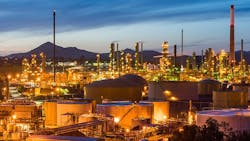Valero to shutter at least one of its California refineries
Valero Energy Corp. has warned the government of California that it will take at least one of its two refineries within the state offline during first-half 2026, fulfilling earlier warnings by industry advocates that recently enacted state legislation governing refiners would lead to unintended consequences, including loss of in-state refining capacity.
Subsidiary Valero Refining Co.—California notified the California Energy Commission (CEC) of its “current intent to idle, restructure, or cease refining operations” at its 145,000-b/d Benicia refinery, just northeast of San Francisco, by the end of April 2026, Valero said in a statement.
While the notification to CEC presumably confirmed only the planned shuttering of the Benicia refinery, Valero stopped short of providing any assurances regarding a commitment to maintaining ongoing operations of its other in-state businesses, which include an 85,000-b/d Wilmington refinery near Los Angeles.
“Valero continues to evaluate strategic alternatives for its remaining operations in California,” the company said in its release.
Lengthening legislative shadow
Valero’s proposal for the Benicia refinery follows Phillips 66 Co.’s October 2024 confirmation that it will permanently cease conventional crude oil processing operations its 138,700-b/d dual-sited refinery in Los Angeles by yearend 2025 amid the operator’s determination that market conditions will prevent the long-term viability and competitiveness of the manufacturing site (OGJ Online, Oct. 17, 2024).
Announcement of the Los Angeles refinery closure came on the heels of California Gov. Gavin Newsom’s Oct. 14, 2024, signing of legislation aimed at making the state’s oil refiners manage California’s gasoline supplies more responsibly to prevent price spikes at the pump.
The legislation specifically provides the CEC more tools for requiring petroleum refiners to backfill supplies and plan for maintenance downtime as a means of helping prevent gasoline-price spikes that cost Californians upwards of $2 billion in 2023, Newsom’s office said.
Introduced in early September 2024 in response to Newsom’s late-August proclamation convening the state’s legislature into special session “to take on Big Oil’s gas-price spikes,” the new legislation allows the state to require that refiners maintain a minimum inventory of fuel to avoid supply shortages that “create higher gasoline prices for consumers and higher profits for the industry,” the governor’s office said.
While Valero did not reveal in its April 2025 statement any specific reasons for its decision on the Benicia refinery, in the wake of the market announcement, Brian W. Jones (R-Calif.) and Vince Fong (R-Calif.) both attributed the pending refinery closure to the legislation and policies heralded by Newsom and state regulatory departments.
“Valero intends to shut down its Benicia refinery thanks to Newsom and radical Democrats’ extreme regulations and hostile business climate,” Jones said on Apr. 16, citing Phillips 66’s decision on the Los Angeles refinery and Chevron Corp.’s relocation of headquarters from San Ramon, Calif., to Houston as additional evidence of state legislation “making it nearly impossible for in-state energy producers to survive.”
In a separate Apr. 16 release, Fong noted Valero’s closure of the Benicia refinery “combined with other recent refinery exits will result in over 20% of the state’s refining capacity disappearing.”
“Newsom’s energy policies of costly mandates and onerous regulations are driving refineries out of the state, making it impossible for needed energy producers to remain economically viable,” Fong said, adding that “refineries and energy companies are closing not because the market is failing but because they have been regulated into retreat.”
Valero—which did not respond to OGJ’s requests for either comment on the statements by Jones and Fong or to offer its own reasons for the proposed shuttering—has remained silent on the matter.
The operator, however, has previously deferred to regional industry group the Western States Petroleum Association (WSPA) as representative of its own industry voice on legislative issues, according to correspondences on regulatory matters OGJ retrieved from the CEC’s online docket.
In a Nov. 16, 2022, e-mail to the CEC declining an invitation to participate as a panelist due to antitrust information sharing constraints in a November 2022 hearing on “California Gasoline Price Spikes, Refinery Operations and Transition to a Clean Transportation Fuels Future,” Valero said it was “supportive of efforts by [WSPA] to discuss more broadly the California energy market.”
WPSA has vigorously shared input with Californian government agencies regarding industry views on the state’s energy legislation and policy. With reference to a more collaborative approach to “strik[ing] an appropriate balance between environmental protection, and affordability, reliability.”
In a series of releases and presentations on legislation related to minimum fuel inventory requirements and profit-margin caps, WPSA has advised government officials as recently as December 2024 that ongoing restraints imposed on refiners by state rulemakings could result “unintended consequences” like capacity reductions.
Trump state climate law EO
We're hearing more about state laws and federal laws impacting oil and gas operations. Read more about an Executive Order signed by President Donald Trump Apr. 8 that moves on state energy rules and standards. Take our quick poll and share your thoughts!
About the Author
Robert Brelsford
Downstream Editor
Robert Brelsford joined Oil & Gas Journal in October 2013 as downstream technology editor after 8 years as a crude oil price and news reporter on spot crude transactions at the US Gulf Coast, West Coast, Canadian, and Latin American markets. He holds a BA (2000) in English from Rice University and an MS (2003) in education and social policy from Northwestern University.

